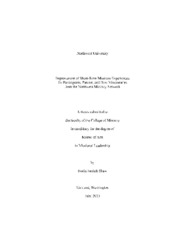| dc.description.abstract | This qualitative study was based upon phenomenological research, using an interpretive approach in order to better understand how individuals and groups comprehend the effectiveness of short-term mission experiences (STM). This research specifically related to the observations of STM from three distinct perspectives: STM participants, pastors of sending congregations, and missionary hosts. All participants, residing in the state of Washington and northern Idaho, were from the Northwest Ministry Network (NWMN) of the Assemblies of God (AG). The participants’ vantage point was obtained via two different methods. Surveys were gathered both by email through a third party and in person at a local church. Face-to-face interviews were also conducted with youth team participants, medical doctors who had engaged in numerous HealthCare Ministry trips, and construction team members. Several pastors were interviewed in order to obtain information concerning the effects of STM on a local congregation. These ministers work in communities and churches of various sizes and are from different parts of the NWMN. The perspectives of lead pastors, missions pastors, and a youth pastor with wide experience in leading STM teams were obtained. In order to discover the perceptions of those on the field who host the teams, a few missionaries also participated in in-depth interviews. To obtain the widest possible spectrum of experiences, interviewees were chosen who work in very dissimilar regions of the world: Europe, Latin America, Northern Asia, and Africa. Following the collection of data, the surveys and interviews were analyzed to find common themes from each perspective. From this feedback, I was able to discover perceptions concerning the things STM does well, what it does poorly, and how the experience can be improved for future STM teams and individuals from the NWMN. | en |


 Maintained by the Northwest University Library
Maintained by the Northwest University Library